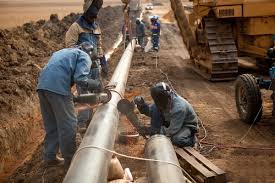Researchers at the Centre for the Study of the Economies of Africa (CSEA), a frontline economic think-tank with focus on emerging economic developments in African continent, have charged the Federal Government to take proactive measures in tackling oil theft incidents in the nation’s hydrocarbon resources industry for improved output, foreign exchange earnings and other benefits from the sector.
The analysts, in the research firm’s ‘Nigeria Economic Update Issue 32’ report published on Tuesday and circulated to our correspondent, noted that despite Nigeria’s oil production increase by 30,000 barrels per day (bpd) from 1.27 million bpd to 1.30 million bpd in July, the country was not optimizing its potential in the sector due to a myriad of challenges.
Citing the Organization of Petroleum Exporting Countries’ (OPEC’s) August Monthly Oil Market Report to support their position, the experts pointed out that the rise in oil output made Nigeria the largest oil producer in Africa and brought the country closer to OPEC’s 2024 production quota of 1.38 million bpd, though significantly lower than the Federal Government’s 2024 budgeted benchmark of 1.78 million bpd.
According to the CSEA’s analysts, the report also showed that crude oil prices increased by $1.21 to $84.43 per barrel in July, signifying strong potential for the country’s foreign reserves and revenue.
While noting that both increases will benefit the Nigerian economy as they will boost oil exports, which will increase foreign exchange inflow and strengthen the nation’s foreign reserves, the analysts lamented that challenges such as oil bunkering, illicit refining, crude oil theft and other production-related issues have ravaged the oil sector, causing oil production to fall below budget and OPEC benchmarks.
On the way to frontally address the challenges, the experts canvassed: “With OPEC increasing Nigeria’s crude oil production quota to 1.5 million bpd in 2025, sustained efforts are required from the government to address these challenges and capitalize on its oil production potential.
“Also, the government should implement stricter security measures and enhance surveillance around oil facilities. This could involve investing in advanced technology for monitoring and tracking oil production to help reduce losses and improve overall efficiency”, they added.






